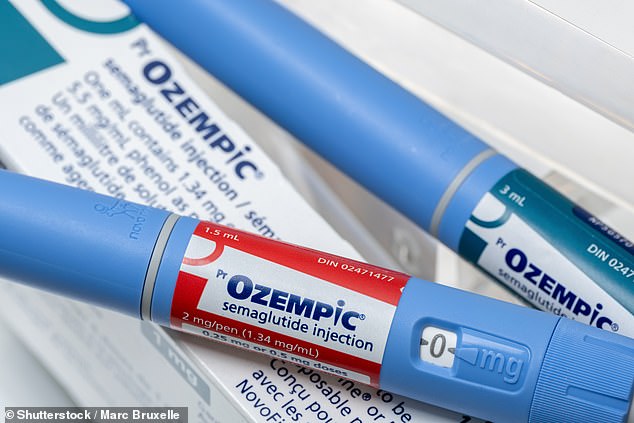Weight loss jabs could help obese patients suffer fewer complications after surgery, research today suggested.
Injections such as Ozempic and Wegovy, hailed by the likes of Elon Musk and Jeremy Clarkson, are proven to help overweight people shed up to two stone.
Now, according to experts, combining the treatments could be the most effective way to shed the pounds quickly before surgery.
The scientists from the US said obese people who may be considered too high risk for bariatric (weight loss) surgery could qualify after taking the drugs.
Research shows patients who are obese — with a body mass index (BMI) score of 30 or more — have a greater chance of developing surgical and anaesthetic complications.
In these individuals, losing between five to ten per cent of their weight this could reduce some of the risks, NHS sources claim.


Now, according to experts, combining the treatments could be the most effective way to shed the pounds quickly before surgery. The scientists, from the US, said obese people who may be considered ‘too sick’ for bariatric surgery could qualify after taking the drugs. Research has long shown patients with extreme obesity — a body mass index (BMI) of over 70 — face a higher risk of complications after surgery
Dr Phil Schauer, study co-author and director of the Metamor Metabolic Institute at Pennington Biomedical in Louisiana said: ‘Combining anti-obesity medications may achieve much greater pre-surgery weight loss than other methods for those with extreme obesity.
‘Many patients who would otherwise be considered “too sick for surgery” may now qualify.’
Under the study, presented today at the American Society for Metabolic and Bariatric Surgery (ASMBS) 2024 Annual Scientific Meeting, 113 people with a BMI of over 70 attempted to lose weight prior to metabolic and bariatric surgery.
Researchers did not reveal the average age or sex of participants or lifestyle factors such as smoking history and diet.
One group, was given a combination of weight loss jabs, while another was offered a single treatment.
The third group were put on a medically supervised diet and exercise plan.
After a follow-up of 73 days on average, scientists found participants on multiple medications saw the greatest percentage total body weight loss (13.1 per cent).
This was followed by those on a single weight loss jab (8.14 per cent).
By comparison, volunteers on the diet and exercise plan saw a reduction of 5.95 per cent.
The scientists also claimed reductions in BMI were also highest between six to 12 months later among those treated with a combination of treatments.
Obesity itself increases the chances of person suffering serious health conditions that can damage the heart, such as high blood pressure, as well as cancers.
Around two in three adults in the UK are obese or overweight, giving the country one of the highest obesity rates in Europe.
Last month, a sobering report also suggested Britain’s spiraling obesity levels have fuelled a staggering 39 per cent rise in type 2 diabetes among people under 40, with 168,000 Brits now living with the illness.
Piling on the pounds has also been linked to at least 13 types of cancer and is the second biggest cause of the disease in the UK, according to Cancer Research UK.
Experts today, however, cautioned that more research was first needed before weight loss jabs are advised to obese patients prior to surgery.


Weight-loss drugs like Ozempic and Wegovy mimic the production of the hormone GLP-1, which helps keep the body full
Dr Marina Kurian, president of the ASMBS, who wasn’t involved in the research, said: ‘More studies are needed to determine the optimal role of GLP-1s before and after metabolic and bariatric surgery among different patient groups.
‘Obesity must be viewed like other chronic diseases where sometimes more than one therapy is necessary over time and for different reasons.’
Semaglutide — sold as Ozempic and Wegovy — and tirzepatide (Mounjaro) have been hailed as a monumental breakthrough in the war on obesity.
The pens, taken once a day, mimics a hormone called GLP-1 and tricks the brain and body into thinking it is full, curbing appetite.
Trials show semaglutide, manufactured by Danish firm Novo Nordisk, helps users lose up to 33lbs (15.3kg) on average in around a year.
Side effects of the jabs including bloating, nausea and acid reflux have long been noted by the government’s drugs watchdog National Institute for Health and Care Excellence (NICE).
Increasing numbers of Ozempic users on social media have also complained of being left with gaunt facial features, sagging ‘melted candle’ skin, ’empty’ breasts and hair loss – which are not thought to be a direct side effect of the medication but a consequence of dramatic slimming.
Analysis suggests the cost of tackling knock-on effects of the jabs on the NHS could run into more than £100million per year.
Others, meanwhile, have warned of bad breath and even sexual dysfunction.
Latest NHS data shows 26 per cent of adults in England are obese and a further 38 per cent are overweight but not obese.
Experts have pointed to a lack of exercise, and poor diets high in ultra-processed food, as being key drivers in the UK’s obesity epidemic.
Wegovy was approved on the NHS last year, specifically for weight loss.
But eligibility criteria for people wanting the get the drug on the NHS — for the standard prescription rate of £9.90 in England — is strict.
Mounjaro was given the green light by NICE for NHS use in September for patients with type 2 diabetes who do not have the condition under control.
It is not yet used by the health service for obesity.
But in February was made available privately in Britain, with clinics charging around £40 for a week’s supply.
Source: Mail Online






